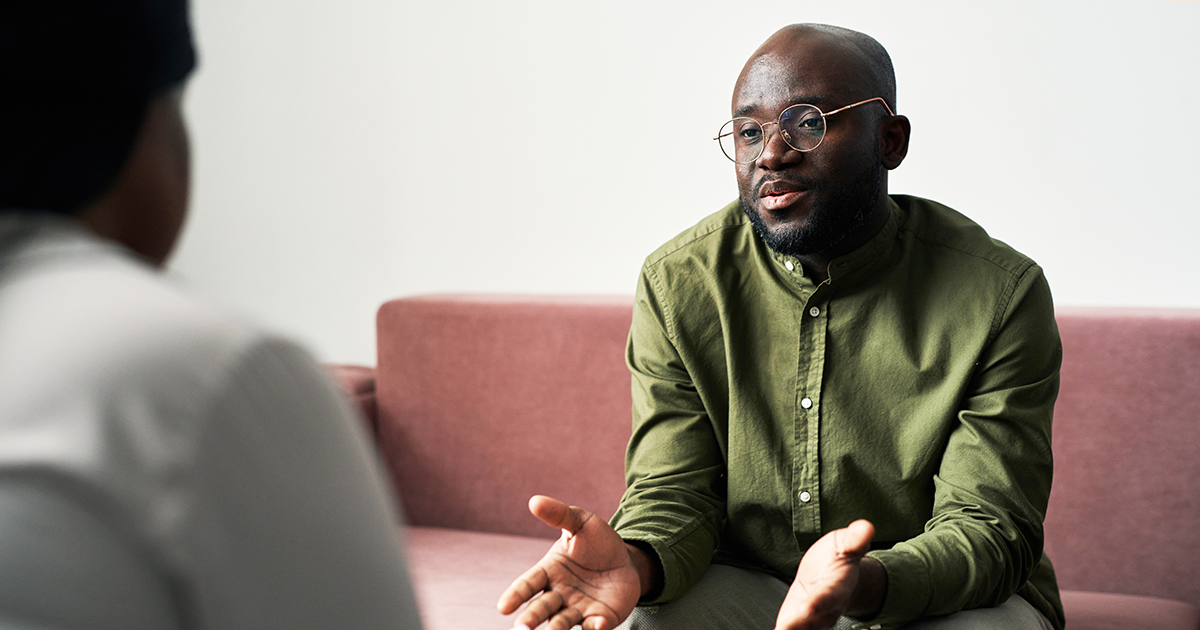Why are men still hesitant to seek out therapy? As a therapist, I think about this question all the time. Eighty percent of people who die by suicide are men. But in 2020, 8% of men reported receiving counseling or therapy from a mental health professional compared to 12% of women.
The stigma of “men being men” remains. Many people still equate masculinity with being self-reliant and not showing your emotions. Maybe not as much as generations past, but it’s still hardwired in so many of us. And it’s keeping men from getting the care they need. Research shows that men who uphold these “masculine” gender norms are more likely to experience distress and less likely to seek help.
Many of us come from cultures of toxic masculinity where young boys are told things like, “Boys don’t cry.” Or if you show any hint of vulnerability, you’re told, “Man up and don’t be a sissy.” In reality, it takes a tremendous amount of strength to face one’s emotions instead of suppressing them. And the research above shows that denying our struggles can lead to things like addiction, violence, or even suicide.

Achieve your mental wellness goals
AbleTo programs give you 24/7 access to tools, activities, and content tailored to your needs. Sign up or log in to start exploring.

Getting honest about our emotions
Taking control of your mental health is no easy task. Trust me, I get it. The stigma is so deeply ingrained in some of us men that we sometimes believe we’re not allowed to be depressed, anxious, or sad. But these feelings are part of the human experience. We must make space for them.
I’ve worked with many men in a therapeutic setting that still question whether they are “man enough” for the world. Some wonder if being in therapy makes them weak. I always tell them the same thing: Being connected to our emotions has the power to positively impact every aspect of our lives. Getting honest with ourselves about the state of our mental health can improve our relationships and lead to healthier and more fulfilling lives.
How to fight mental health stigma
What can you do to change this damaging narrative surrounding men and their need to be strong all of the time? Below are a few ideas.
- Share the love: Pass this article along to someone who could benefit from support.
- Set a good example: Show those around you that the strongest thing you can do is to ask for help when you need it, whether it be from a friend, a family member, or a mental health professional.
- Talk to kids: Teach the young people in your life that putting their mental health first is a sign of strength, not weakness.
- Use coping tools: If you’re already an AbleTo member, you have access to guided journals, meditations, breathing exercises, and more.
Mental health support is for everyone
If you reach out for support, it will not make you less of a man, I promise you. It will help you navigate the storms that we all go through in life. You’re not alone in whatever you’re going through. We’re here for you.
Need help putting these tips into practice?
You may be eligible for virtual therapy, coaching, or on-demand self care from AbleTo. Each program is designed by clinicians and grounded in science. Sign up today and get the support you deserve.
By Giacomo Lucchetti, LCSW
Giacomo is a clinical social worker, providing psychotherapy and social services to people of all ages. When he’s not seeing clients, he enjoys watching history documentaries, keeping up with the latest technology, and spending time with his family and 3 rescue dogs.
Clinically reviewed by Hayley Quinn, PsyD.
Photo by pressmaster/Adobe Stock. Individuals in photographs do not represent AbleTo participants.
The information featured on this site is general in nature. The site provides health information designed to complement your personal health management. It does not provide medical advice or health services and is not meant to replace professional advice or imply coverage of specific clinical services or products. The inclusion of links to other websites does not imply any endorsement of the material on such websites.


